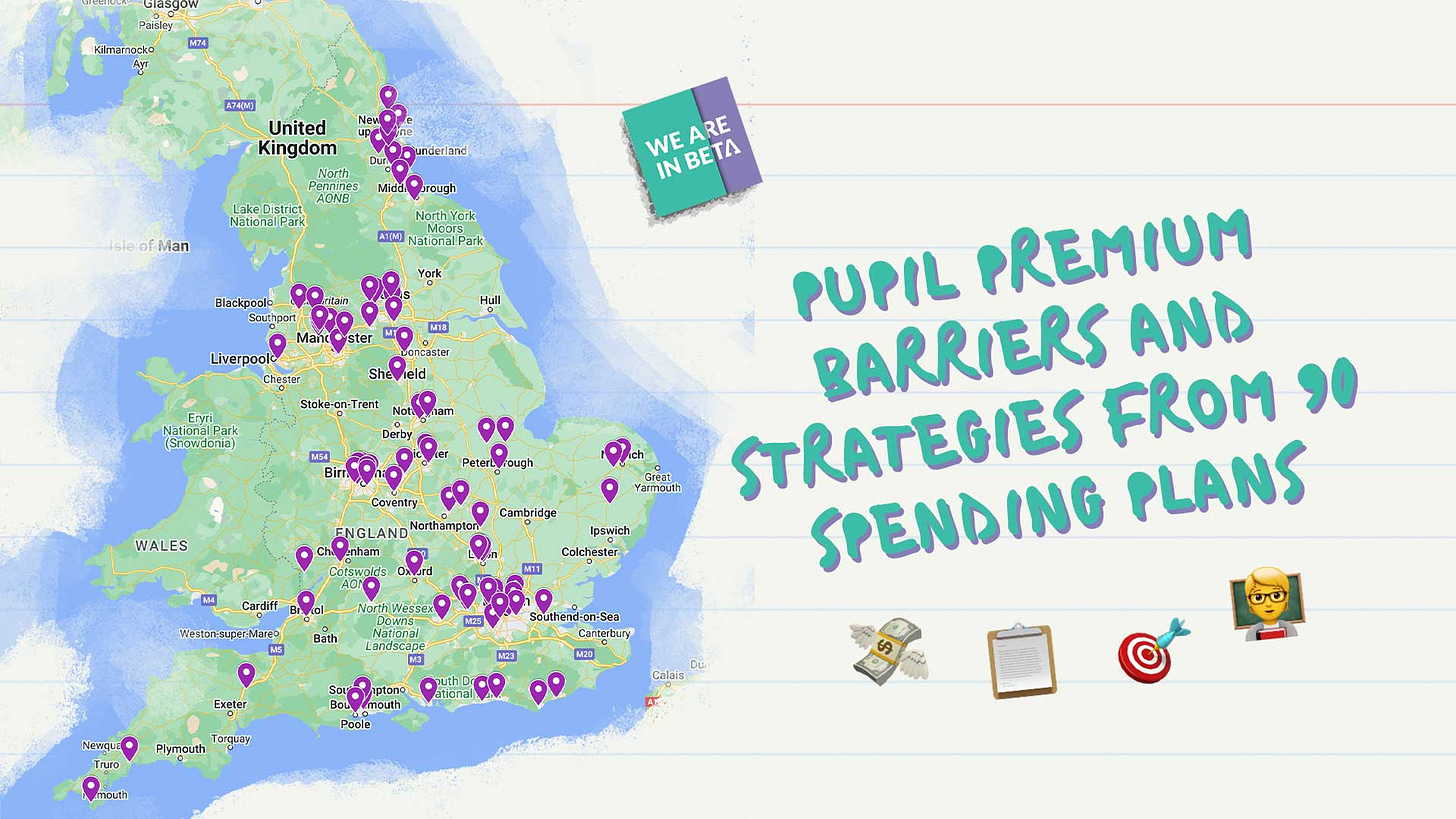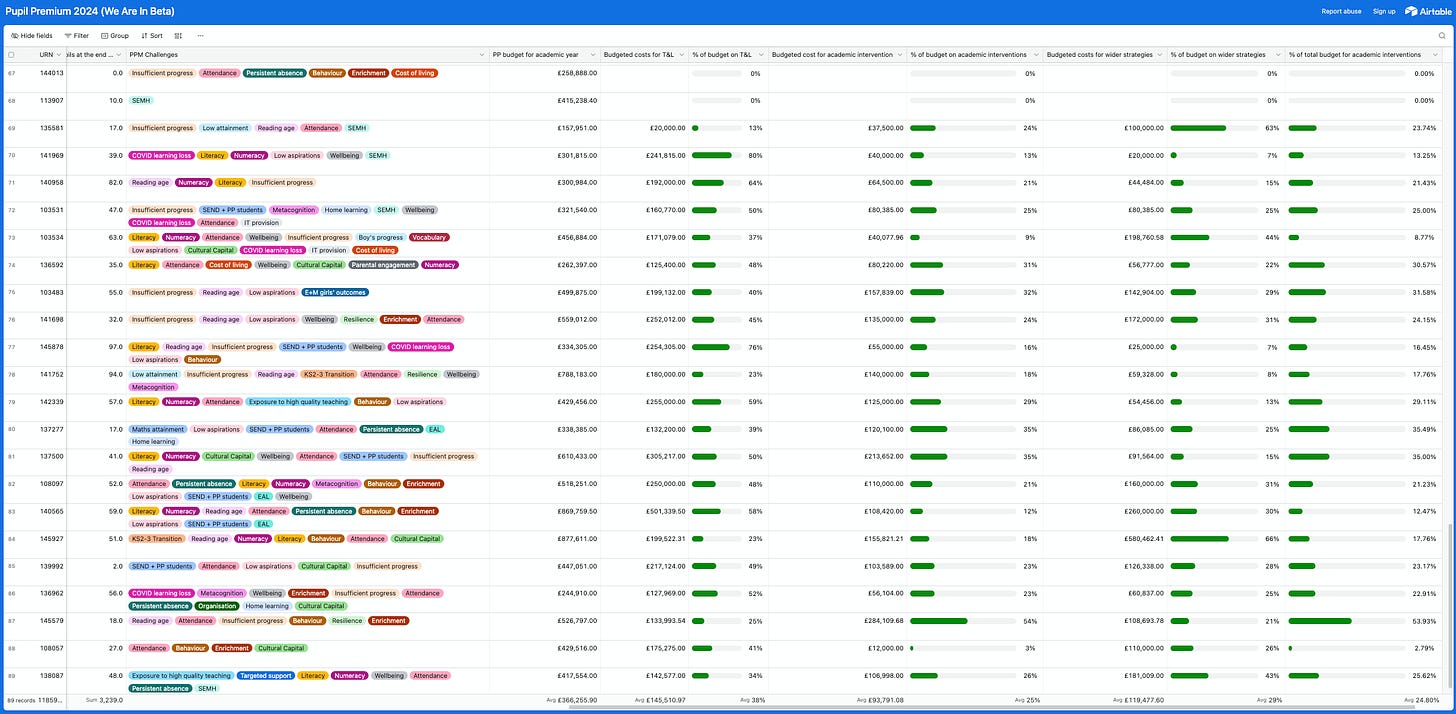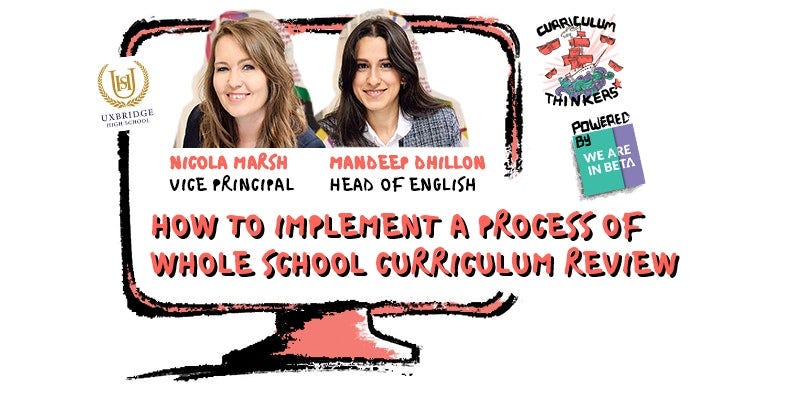Pupil Premium
Challenges, strategies and spending: analysis of 89 schools with a track record of securing positive progress for disadvantaged students
How do you make sure the limited funding in our system makes the biggest impact on the students who need it the most?
It’s a huge question.
In this week’s highlight from the We Are In Beta community, Researcher - Will Hirtzel, shines a light on how schools, with a track record of securing positive outcomes for disadvantaged students, do it with PPM their funding.
Whether you’re a senior leader allocating funding, a middle leader bidding for it, or teacher working with what you’ve been allocated, learning how to best deploy Pupil Premium is vital to the success of all students.
We - schools - Are In Beta - always learning (when we get the best bang for our buck for our students).
This week inside We Are In Beta
💰 Pupil Premium: barriers, challenges and spending.
🎥 How to Implement a Process of Whole School Curriculum Review.
💼 Jobs with We Are In Beta community members.
💰 Pupil Premium: barriers, challenges and spending
What are the biggest challenges to pupil premium students? What are the most frequently employed strategies by schools to tackle them? And how much funding to they allocate to them?
These were key questions Will (Deputy Head of Year 13 and former KS4 Coordinator) set out to answer through his research. Here’s a flavour of what he found.
What are the most common challenges facing PPM students in secondary schools?
Below outlines the key findings from our collective research of 89 secondary schools, with positive P8 figures for disadvantaged students.
After scrutinising all of their spending plans, the following challenges were most frequently identified:
Attendance (70 schools)
Low aspirations (42 schools)
Literacy (42 schools)
Reading age (41 schools)
Cultural capital (34 schools)
COVID learning loss (32 schools)
SEMH (31 schools)
Insufficient progress (30 schools)
Numeracy (30 schools)
Wellbeing (29 schools)
Behaviour (28 schools)
Enrichment (21 schools)
Home learning (21 schools)
Parental engagement (20 schools)
Poor attendance coming out as (by far) the biggest barrier to learning is not surprising given the challenges schools have faced since covid.
What are the top 5 Pupil Premium spending strategies that align with DfE and EEF guidance?
Here are the most frequently cited strategies schools use to tackle the challenges they identified.
High Quality Teaching
Literacy interventions (26 schools)
Professional development to support implementation of approaches (26 schools)
Supporting the recruitment and retention of teaching staff (19 schools)
Leadership responsibilities (12 schools)
Smaller/ group/ classes (10 schools)
Targeted Academic Support
1 to 1 school-led tutoring (11 schools)
Small group intervention for English and Maths (11 schools)
Adult mentoring (10 schools)
Targeted reading intervention (9 schools)
Out of hours tuition (8 schools)
Wider strategies
Attendance (24 schools)
Extracurricular involvement (22 schools)
Trips and Visits (20 schools)
Student Support/Wellbeing (20 schools)
Careers Education (17 schools)
How much do secondary schools spend on each of the three pupil premium approaches in the menu?
In his, report for each of the 3 approaches, Will breaks down the following
Largest allocation (£)
Smallest allocation (£)
Range (£)
Average budget (£)
Least allocated as a proportion of total budget (%)
Most allocated as proportion of total budget (%)
🎥 How to Implement a Process of Whole School Curriculum Review
How can whole school systems and processes be created that not only support the improvement of curricula in departments, but facilitate effective support between SLT and middle leaders?
Join us to learn how Uxbridge High successfully designed and implemented a process of whole school curriculum review with the goal of developing curriculum across all subject areas.
📆 Thur 17th October
⏰ 4.15pm
💼 Jobs with We Are In Beta community members.
If you want to get your vacancies seen by the 14.5k school leaders and teachers who get this email, let us know here and we’ll send more info.
Senior Leadership
Teacher of Teachers (Extended Leadership Team) - Alvaston Moor Academy (Archway Learning Trust) (Derby).
Deputy Headteacher - Orchard Park High School - Greenshaw Learning Trust (Croydon).
Middle Leadership
🕌 Head of Religious Education - Orchard Park High School - Greenshaw Learning Trust (Croydon).
🛠️ Head of D&T - Yate Academy - Greenshaw Learning Trust (Bristol).
🎭 Head of Expressive Arts - Yate Academy - Greenshaw Learning Trust (Bristol).
📖 Assistant Director of English - The Wrenn School - Excalibur MAT) (Reading).
🧬 Head of Science - Bohunt Horsham - Bohunt Education Trust (West Sussex).
Teaching
📖 English - Orchard Park High School - Greenshaw Learning Trust (Croydon).
🛠️ D&T - Yate Academy - Greenshaw Learning Trust (Bristol).
🛠️ D&T - The Wrenn School - Excalibur MAT) (Reading).
🍳 Food Tech - Bohunt Horsham - Bohunt Education Trust (West Sussex).
🧠 Social Science - Yate Academy - Greenshaw Learning Trust (Bristol).
🏑 PE - Yate Academy - Greenshaw Learning Trust (Bristol).
Learning support and operations
Teaching Assistant (Level 3) - Orchard Park High School - Greenshaw Learning Trust (Croydon).
Regional HR Partner - Regional HR Partner (Croydon).
📰 Pastoral and MAT Leader newsletter launches
In case you missed the update here, we’re launching two new newsletters soon for:
Pastoral Leaders (join waiting list here)
Exec School Improvement Leaders (join waiting list here)
Expect practical case studies, resources, policy analysis and more.
On a personal note.
I bid for funding twice when teaching.
The first time I was (very) unsuccessful. The second time I had better luck.
When I was unsuccessful I failed to do the following well enough:
identify the problem
define the solution (or my plan to implement it)
draw upon the evidence to back my argument
outline how I measure the impact
Having access to the bank of Pupil Premium Spending Plans from successful schools here would have saved me a lot of work and disappointment. Reading them, through the lens of the DfE’s PPM framework (challenges, outcomes, strategies, evidence, etc) would have helped me see successful models.
This is the second time we have reviewed PPM plans from schools (access the first here). It’s hugely encouraging to see how increasingly evidence led the decisions schools are making are.
Thanks for reading.
@NiallAlcock and the We Are In Beta team
Sent this by a friend?
📱 Get 18,884 school leaders and teachers in your pocket - download We Are In Beta.
🚀 Looking for a new role? Get updates about specific jobs you’re looking for before anyone else.
🆕 New here? Catch up with previous editions, podcasts and webinars via the archive.






